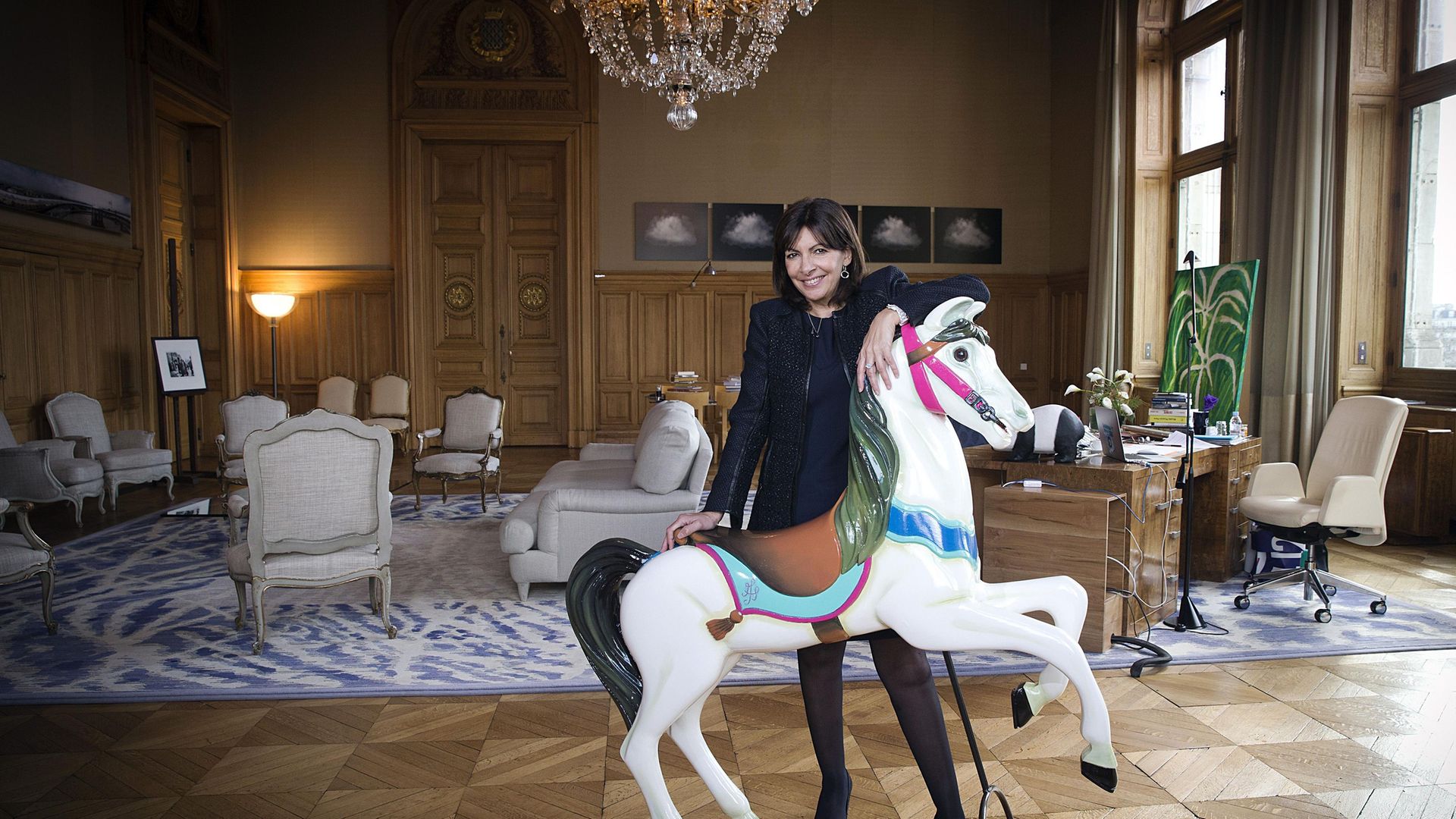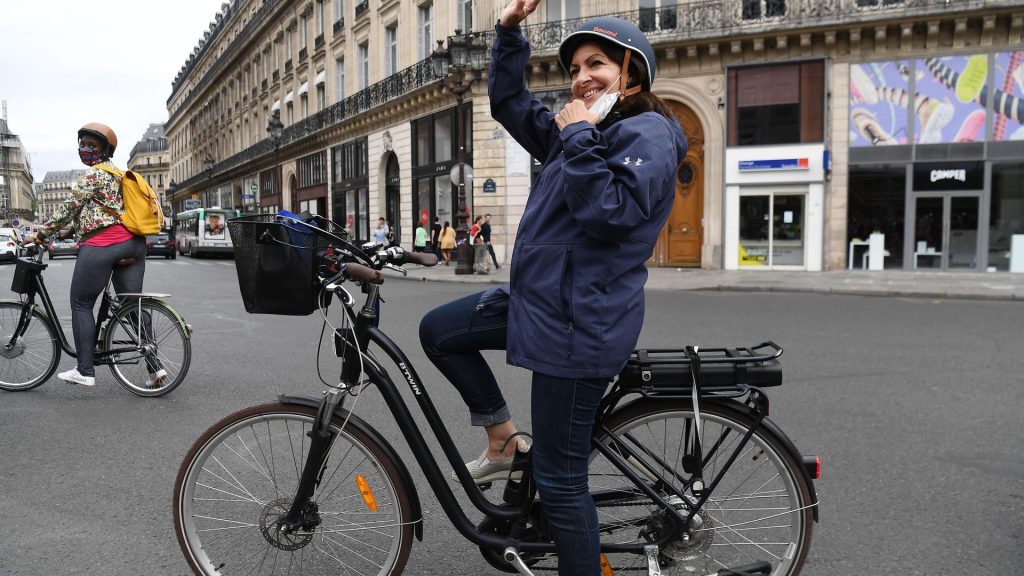
Paris mayor Anne Hidalgo has the profile and ambition to run against Emmanuel Macron for the French presidency. But her greatest strengths might also be what prevents this ‘Queen of the Bobos’ from reviving the country’s moribund Socialists
Despite not yet having declared her candidacy for next year’s presidential elections, mayor of Paris Anne Hidalgo is certainly telegraphing her intentions: why else would the regional politician this year begin a national tour that took her to Nancy in France’s far east, before being curtailed by a new round of coronavirus restrictions?
When she does declare – and most observers consider it merely a matter of time – Hidalgo will not be the first female candidate with a serious shot at the office – Ségolène Royal and Marine Le Pen, who will be back next year, hold that particular distinction. What she just might be, however, is the Socialist party’s only hope.
Indeed, Hidalgo’s strongest suit is that people know who she is – which is more than can be said for most of the current crop of Socialist party politicians.
Battered by Emmanuel Macron in the 2017 presidential election, the Socialist party has in the intervening years failed to recover. This stands in contrast to the right-wing Republicans who, having also been on the receiving end of a bruising defeat by Macron, have, in the face of a seemingly endless litany of financial scandals, at least rallied their supporters in the hopes of being fighting fit in time for next year.
The Socialists should not be in such bad shape: over time, Macron has moved to the right, yet this has done nothing to buoy the party. The problem is that, outflanked on the left by Jean-Luc Mélenchon’s Unbowed France and by eco party Europe Ecology – The Greens (EELV) among more middle class voters, no-one quite knows what the party, an early pioneer of right-ward liberal drift among European socialist parties, stands for.
People do know what Hidalgo stands for, though. Comparisons across borders are always fraught affairs, but in a sense Hidalgo is reminiscent of her opposite number in London, Sadiq Kahn: the beneficiary of a regional job that gives its holder a massive national, even international, profile, and a freedom to operate outside of national party lines, Hidalgo has long planned to reimagine Paris as an urban paradise for walkers and bicycle riders, pitched as major quality of life improvements in the capital.
Since she took office, traffic slowing and re-routing measures have appeared all over the capital, and swathes of the banks of the Seine have been closed to motorised vehicles. The pandemic has only accelerated this, with more streets closed to traffic or made one-way only, while vast cycle paths have appeared. Her more outlandish plans include turning both the Périphérique, the orbital motorway surrounding the capital, and the Avenue des Champs-Élysées into parks.

Hidalgo’s urban renewal has been a painful process, though, and one that has not yet borne fruit. If it does, Paris will be transformed into the dream-like city many outsiders believe it to be (in doing so perhaps ridding the world of Paris syndrome, a form of nervous breakdowns caused by reality’s failure to live up to expectations) and Hidalgo will go down in history books. If not, she will have earned the mocking title “Queen of the Bobos”, a moniker suggesting she cares only for the wellbeing of well-heeled hipsters, or Bobos.
For now, though, her hostility to the motor car has had mixed results. Doubtlessly the streets are made more pleasant, but Paris is a tiny – and expensive – city, with the vast majority of those on modest incomes living extramuros.
Some of these banlieusards are well-served by high speed suburban rail and even, in a few cases, the metro, but many are left to struggle with slow and unpredictable busses. Or else drive. Ironically, then, the Socialist mayor’s car bans make life harder for those who cannot afford to live in the city in the first place.
A recent Twitter hashtag campaign, #SaccageParis (‘trashed Paris’), took a swipe at Hidalgo’s stewardship of the city. Her supporters claim it as a manoeuvre by her right-wing opponents, and they were at the very least certainly happy to jump in, but it is also undeniable that Paris is not only festooned with rubbish and teeming with shacks inhabited by the homeless (neither of which is Hidalgo’s fault), but also suffering from years of noisy and disruptive roadworks that very much are.
In this sense Hidalgo’s credentials are impeccable: the one thing a prospective president of France can never lack is a vision. Now, having reshaped the capital in her own likeness, the country as a whole is in her sights.
Mettle is unlikely to prove a problem. Having been elected mayor in 2014, the Andalusia-born granddaughter of a Spanish Civil war veteran, has seen her political career defined as much by forces beyond her control as by her own vision: it was forged in a crucible of fire, starting with the attacks on the Charlie Hebdo offices in her first year in office, followed by what at times felt like an unending terror threat in the city.
She has also faced down political opponents, none more so than than the president himself, whose job she now covets. Getting there will prove a challenge, but from her revolutionary grandfather to her son, who aged 16 became the youngest ever cross-Channel swimmer, she seems to come from a family that likes a challenge.
In fact, she is already known to be pugnacious and displayed her political abilities last year handily seeing off Republican Rachida Dati to win a second term as mayor. Indeed, Saveria Rojek titled her 2020 biography of Hidalgo simply: Ruthless.
The problem for both Hidalgo and her party is that despite all of this, and the advantage of name recognition, she is not polling well.
A joint survey by pollsters Ifop and Fiducal, conducted for newspaper Le Journal du Dimanche and broadcaster Sud Radio, found voters were once again coalescing around the incumbent Macron and his 2017 opponent, far-right Marine Le Pen.
Hidalgo scored only 10% in the poll, even in the most favourable predicted circumstance where she would receive the backing of the Greens and the Communist party. Another poll, this one conducted by Elabe for news channel BFMTV, gave her just 5%.
One problem for Hidalgo, and certainly the reason for her national tour, is Paris itself. Yes, being mayor of Paris gives the office holder a lot of political power and an unmatched national profile. But, on the other hand, plenty of the denizens of so-called France profonde (‘deep France’) or France périphérique (peripheral France) hate Paris and all of its inhabitants, seeing the capital as little more than a nesting place of the wealthy, the power-hungry and the aloof.
Another poll found that Hidalgo could only make it to the second round of the presidential election if she had the combined support of all of the left-wing parties and the Greens. A near impossibility, then, given that the always fractious left is extra busy this year tearing itself to pieces over questions of secularism versus identity politics imported from the United States.
But polls can be wrong, as can journalists and commentators – who among us seriously expected Macron’s 2017 victory? – so a 2022 face-off with Macron remains a possibility. And it would also be an opportunity to settle old scores.
Macron is also known to dislike Hidalgo – and the feeling appears to be mutual. A recent edition of centre-left newspaper Libération spelled it out in great detail with a front page splash declaring it would reveal “Why they hate each other”. Inside, the newspaper reported that, long opponents, they first seriously clashed over Macron’s liberalising of Sunday trading rules when he was a member of the Socialist party government of François Hollande.
Macron eventually got his way, though not entirely it has to be said: while not as quiet as a Sunday in Germany or Italy, in France retail workers typically still have a day of rest. For her part, Hidalgo is said to be annoyed that Macron’s reformist programme stole her thunder: when he won in 2017 she was supposedly busily plotting to run a more or less identical platform – in 2022.
But the problem with Liberation’s dream of a face-off is precisely that: unlike another round of Le Pen vs Macron, in a fight between the liberal Macron and barely left Hidalgo nothing political would be at stake. As things stand, a re-run of Macron versus Le Pen remains the more plausible scenario. Still, personal fights can be even more vicious than political ones and if next year it does conspire to offer Hidalgo and Macron the opportunity for a rematch then no doubt the gloves will come off.
2022 candidates
Emmanuel Macron
Currently leading, albeit only just, in most polls, recent reports suggest the incumbent is frustrated with being seen as the “Covid president”. Macron scrapped much of his reform agenda when the pandemic hit, but it is, to say the least, unclear that the French public would now warm to a campaign that openly preached austerity.
Marine Le Pen
The leader of the far-right National Rally has not profited particularly from the pandemic, but she remains the go-to protest vote candidate. Indeed, she may not need to have profited from the crisis as her poll figures have remained high, with most placing her just behind Macron – and some placing the pair neck and neck.
Xavier Bertrand
Rising star of the right wing Republican party, Bertrand garnered 16% in Ifop’s poll but faces a similar problem to Hidalgo: in the face of Macron’s simultaneous occupation of the centre and right, how can he put clear blue water between himself and the president?
Jean-Luc Mélenchon
Far-left leader Mélenchon is a perennial presidential candidate and currently outpolling Hidalgo. Popular with young voters, Mélenchon is nonetheless likely too divisive and ideologically committed to be seen as a serious contender for reaching the Elysée.
Edouard Philippe
The next Macron? A former Republican lured to become prime minister under Macron until being replaced by Jean Castex, the business-friendly right-wing liberal is waiting in the long grass, hoping to present the acceptable face of reform, but would have to run his campaign without the support of an established party machine. Sounds familiar…
What do you think? Have your say on this and more by emailing letters@theneweuropean.co.uk









